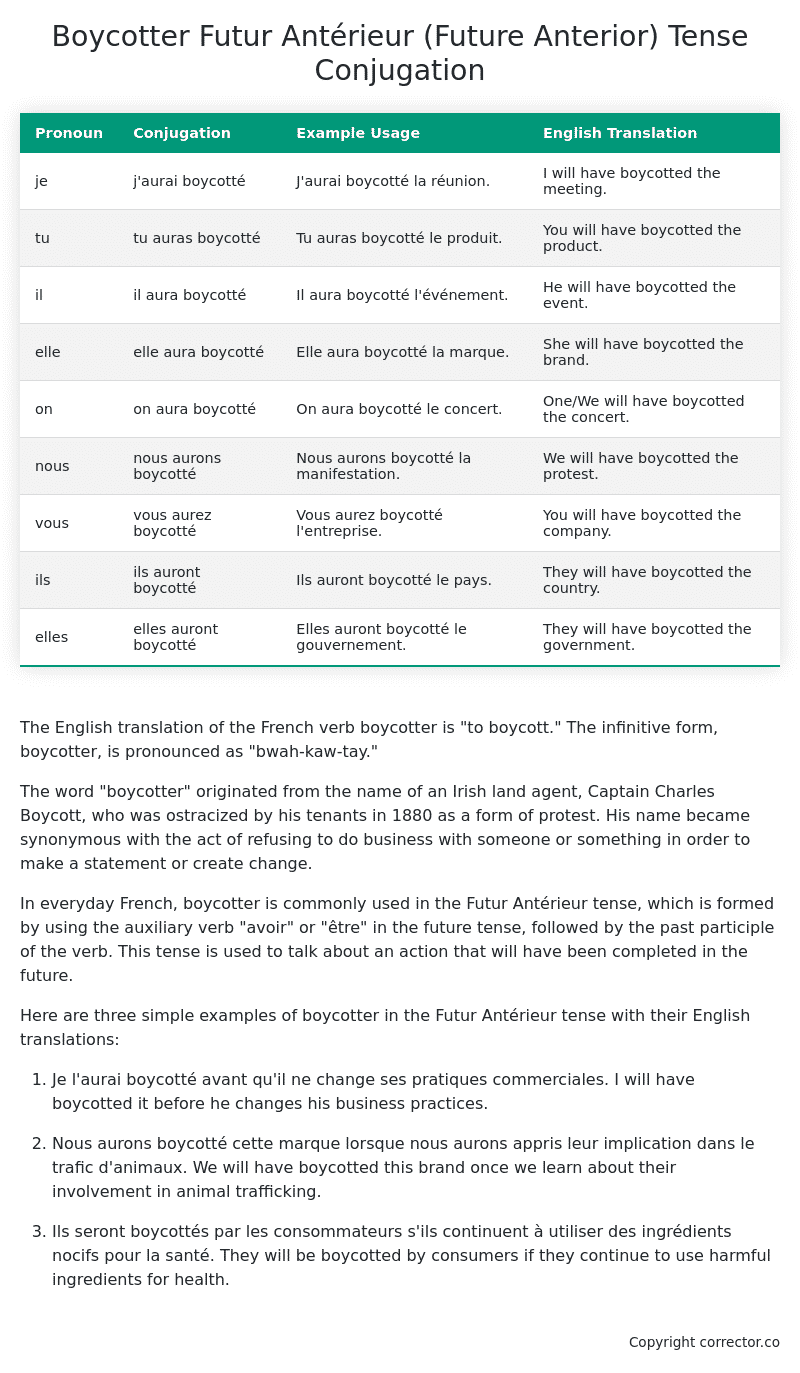Futur Antérieur (Future Anterior) Tense Conjugation of the French Verb boycotter
Introduction to the verb boycotter
The English translation of the French verb boycotter is “to boycott.” The infinitive form, boycotter, is pronounced as “bwah-kaw-tay.”
The word “boycotter” originated from the name of an Irish land agent, Captain Charles Boycott, who was ostracized by his tenants in 1880 as a form of protest. His name became synonymous with the act of refusing to do business with someone or something in order to make a statement or create change.
In everyday French, boycotter is commonly used in the Futur Antérieur tense, which is formed by using the auxiliary verb “avoir” or “être” in the future tense, followed by the past participle of the verb. This tense is used to talk about an action that will have been completed in the future.
Here are three simple examples of boycotter in the Futur Antérieur tense with their English translations:
-
Je l’aurai boycotté avant qu’il ne change ses pratiques commerciales.
I will have boycotted it before he changes his business practices. -
Nous aurons boycotté cette marque lorsque nous aurons appris leur implication dans le trafic d’animaux.
We will have boycotted this brand once we learn about their involvement in animal trafficking. -
Ils seront boycottés par les consommateurs s’ils continuent à utiliser des ingrédients nocifs pour la santé.
They will be boycotted by consumers if they continue to use harmful ingredients for health.
Table of the Futur Antérieur (Future Anterior) Tense Conjugation of boycotter
| Pronoun | Conjugation | Example Usage | English Translation |
|---|---|---|---|
| je | j’aurai boycotté | J’aurai boycotté la réunion. | I will have boycotted the meeting. |
| tu | tu auras boycotté | Tu auras boycotté le produit. | You will have boycotted the product. |
| il | il aura boycotté | Il aura boycotté l’événement. | He will have boycotted the event. |
| elle | elle aura boycotté | Elle aura boycotté la marque. | She will have boycotted the brand. |
| on | on aura boycotté | On aura boycotté le concert. | One/We will have boycotted the concert. |
| nous | nous aurons boycotté | Nous aurons boycotté la manifestation. | We will have boycotted the protest. |
| vous | vous aurez boycotté | Vous aurez boycotté l’entreprise. | You will have boycotted the company. |
| ils | ils auront boycotté | Ils auront boycotté le pays. | They will have boycotted the country. |
| elles | elles auront boycotté | Elles auront boycotté le gouvernement. | They will have boycotted the government. |
Other Conjugations for Boycotter.
Le Present (Present Tense) Conjugation of the French Verb boycotter
Imparfait (Imperfect) Tense Conjugation of the French Verb boycotter
Passé Simple (Simple Past) Tense Conjugation of the French Verb boycotter
Passé Composé (Present Perfect) Tense Conjugation of the French Verb boycotter
Futur Simple (Simple Future) Tense Conjugation of the French Verb boycotter
Futur Proche (Near Future) Tense Conjugation of the French Verb boycotter
Plus-que-parfait (Pluperfect) Tense Conjugation of the French Verb boycotter
Passé Antérieur (Past Anterior) Tense Conjugation of the French Verb boycotter
Futur Antérieur (Future Anterior) Tense Conjugation of the French Verb boycotter (this article)
Subjonctif Présent (Subjunctive Present) Tense Conjugation of the French Verb boycotter
Subjonctif Passé (Subjunctive Past) Tense Conjugation of the French Verb boycotter
Subjonctif Imparfait (Subjunctive Imperfect) Tense Conjugation of the French Verb boycotter
Subjonctif Plus-que-parfait (Subjunctive Pluperfect) Tense Conjugation of the French Verb boycotter
Conditionnel Présent (Conditional Present) Tense Conjugation of the French Verb boycotter
Conditionnel Passé (Conditional Past) Tense Conjugation of the French Verb boycotter
L’impératif Présent (Imperative Present) Tense Conjugation of the French Verb boycotter
L’infinitif Présent (Infinitive Present) Tense Conjugation of the French Verb boycotter
Struggling with French verbs or the language in general? Why not use our free French Grammar Checker – no registration required!
Get a FREE Download Study Sheet of this Conjugation 🔥
Simply right click the image below, click “save image” and get your free reference for the boycotter Futur Antérieur tense conjugation!

Boycotter – About the French Futur Antérieur (Future Anterior) Tense
Construction
Common Everyday Usage Patterns
Interactions with Other Tenses
For example
Summary
I hope you enjoyed this article on the verb boycotter. Still in a learning mood? Check out another TOTALLY random French verb conjugation!


